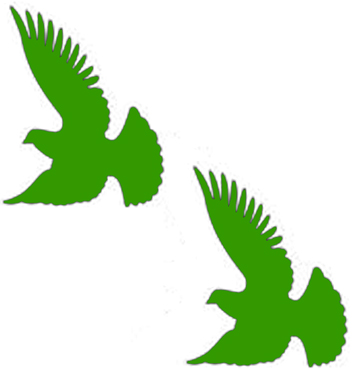Q: I am having horrendous problems with my birds hitting the power lines behind my home out over the pasture. I have lost 17 birds to the wires this year. I have had many more injured, torn breasts, broke legs, etc. I can't think of anything I might do short of quitting pigeons.
It is certainly no fun living next to power lines, whether you are a human or a bird, but there are ways that you can cope.
My good friend Bill Solt has flown very successfully living next to power lines for 35 years. In fact, he has been one of the top flyers in Chicago.
First of all, the reason pigeons hit power lines is that when they fly in a flock, the bird in front may just barely avoid a power line almost in a daredevil type of play. However, the birds in the back of the flock do not see the wire. They cannot react quickly enough and are the ones that get killed or cut up.
The first and foremost thing that you must do is never exercise your birds in a flock greater than 20-24 birds. I don't know what Bill's magic number was, but I will find out. Although that seems like an awfully small number of birds to work with, it can be done very successfully.
In young birds, where this will be your greatest problem, separate your birds by age groups, such as first round, second round, etc. You should have time in the summer to exercise more than one group early in the morning. Also, I usually exercise the younger ones in the afternoon. Birds do not have to be exercised twice a day as we normally do. You will find that when birds are exercised only once a day, you will get a more intense and longer flying out of them.
Later in the season, prior to the beginning of young bird races, there is a big advantage to exercising your young hens and young cocks separately. You will find that they will fly much better when the sexes are out at different times. Separating the young birds by sex also sets you up for a very nice motivational system when it comes to the races.
Another advantageous tactic to use once the races start -- I personally keep the birds that raced that week separate from the ones that
did not race. In other words, I exercise them separately. The birds that were at home work much better around the loft when flying by themselves. The birds that were raced do not hold the other ones down; the race birds also recuperate at the rate they need to when they are not forced or dragged up to exercise with the birds that did not race.
In old bird flying, Bill Solt always competed with a small but very good widowhood team. This can be carried one step further by flying double widowhood where you exercise one sex in the morning and the other in the evening.
If you are flying on the nest, exercise your cock birds in the a.m. and your natural hens in the p.m. By separating the sexes for exercise, even when using the natural system in old birds, you will find a great improvement in the way your birds work. I have followed similar methods for many years.
When it is all said and done, your handicap and frustration of living next to high tension wires will turn out to be a positive. You will be forced to be resourceful, much more observant, and your race birds will increase their exercise time by far. Your methods will be refined for the positive. In general, you will know your birds much better than ever before, and their performance will go up. You will be closer to your birds and ultimately will get much more pleasure from them.
Hope to hear from you somewhere down the line with good race results.
